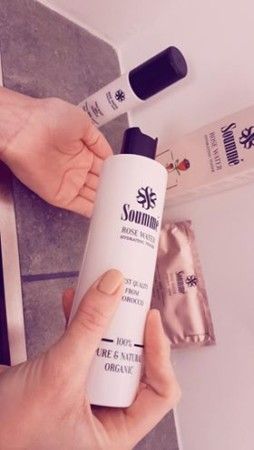Natural alternatives for heartburn
Almost everyone knows the feeling: eaten too much, too spicy or too fat and already it burns unpleasantly behind the breastbone. Heartburn know about 20% of the German population even regularly.
Many then reflexively reach for the relevant medications, such as antacids or proton pump inhibitors (PPI). These usually help quickly, the doctor prescribes them without problems even in the long term and the pills are sold as stomach protection. So All Good?
Unfortunately not! Because many of the medicines bring little known, but sometimes enormous risks with them. On the other hand, Mother Nature has already taken precautions.
There are many completely natural remedies that help against heartburn better and more effectively than their pharmaceutical counterparts and have virtually no risks and side effects.
You do not believe that?
We are therefore pleased to present 10 completely natural alternatives to classic reflux medications, which almost everyone has at home and which are proven to work better than the drugs (proven with scientific studies).
Heartburn and the causes
Heartburn has many causes. What you eat plays a big role, as well as stress, an unhealthy lifestyle (smoking, drinking, little exercise) and many other factors.
This loosens the sphincter between the stomach and esophagus, so to speak. When this important valve fails to close properly, it allows acidic gastric juice to slosh back into the sensitive esophagus, causing the unpleasant symptoms of heartburn.
If you’ve ever experienced severe heartburn, then you know it’s not a fun experience. In English-speaking countries, heartburn is called “heartburn”. And in fact, a surprising number of people even confuse severe reflux with a heart attack.
So it’s not uncommon to visit the doctor for acute or frequent heartburn. It is then almost as normal that drugs are prescribed immediately without really working on the causes.
Medications for heartburn: Stomach protection with risks
Medications against heartburn are usually based on the assumption that the cause of heartburn is too much stomach acid (which, by the way, is often not true). The drugs either bind stomach acid (antacids) or reduce its production (proton pump inhibitors).
Originally these drugs were developed as a short-term therapy. But doctors now like to prescribe them often and for the long term.
Overmedication for heartburn
In Germany alone, 3.6 billion daily doses of proton pump inhibitors are currently prescribed annually, according to the 2018 Prescription Drug Report. This is about three times more than it was ten years ago. PPIs are also the third most sold group of medications worldwide overall.
The remedies are sold as “stomach protection”. And after all, who does not want to protect his stomach? All good then? If drugs are prescribed so often, they must be effective and well-tested, and therefore have few risks, right??
Risks of heartburn medications
Various long-term studies show us that reflux medications can pose several serious risks when taken over the long term.
Here are just a few of the weightiest examples:
- drug-induced bone fractures,
- various deficiency symptoms,
- increased risk of severe intestinal infections,
- greatly increased risk of death (25% higher than in people who do not take PPI long term),
- enormously high risk of heart attack (100% higher than in people who do not take PPI long-term),
- high risk of cancer (340% higher than people who do not take PPI long term).
So it’s little wonder that many people are looking for natural alternatives to traditional reflux medications.
Natural alternatives to reflux medication
When it comes to alternative medicine, unfortunately, the internet is full of unsubstantiated claims about. We therefore show you here some hand-picked alternatives to the classic drugs.
All are completely natural, based on scientific research, and are significantly less risky (or risk-free) than their pharmacological counterparts.
But not only that: in most cases, the natural alternatives are actually much more effective against heartburn than the drugs developed specifically for this purpose.
5 powerful vegetables for heartburn
It’s hard to believe, but some widely used vegetables are actually very effective remedies for heartburn, as 2 studies from 2016 and 2017 show us [source 1, source 2].
The studies were both conducted on an artificial stomach and compare the acid-neutralizing effect of various vegetables with other known antacids, such as sodium bicarbonate and also a drug against heartburn (Eno)
Results show that the following vegetables are particularly effective against heartburn:
- 1. Broccoli (just as effective as the drug Eno),
- 2. Green cucumber,
- 3. Spinach,
- 4. Radish,
- 5. Kale.
So if you have heartburn, you can just eat some of these great vegetables. Your heartburn will get better very quickly.
If you have all the vegetables mentioned at home, it is also easy to mix a delicious green anti-heartburn smoothie from them (smoothie recipe).
Ginger as a natural remedy for heartburn
The pungent root of ginger is not to everyone’s taste, but medically it is extremely effective and versatile.
Ginger helps z.B. for various forms of nausea (pregnancy, seasickness, etc.).), stomach ulcers, as well as other gastrointestinal disorders and even protects the human genome from damage through antioxidants.
Practically on the “side job,” ginger is also a pretty good natural remedy for heartburn. As evidenced by another study [Source 3].
Study:
The ginger study compares properties of a well-known PPI drug (lansoprazole) with properties of some ingredients of ginger.
Results:
The results are impressive, because they prove that certain components of ginger are 6 to 8 times more effective against heartburn than lansoprazole.
Ginger is up to 800% more effective against heartburn than the special drug.
So one can recommend with a clear conscience to always have some fresh Inger at home. If you don’t like the taste, you can also use ginger capsules or ginger tea (if necessary the pickled ginger from your last sushi meal).
Acupuncture as an alternative treatment for heartburn
The typical conventional medical therapy for severe acid reflux is to prescribe strong acid blocking drugs. If these do not work as desired, the dose is usually simply doubled. This is normal procedure.
In another study, exactly this procedure was questioned [source 4].
Study:
The study participants were people who suffered from the so-called reflux disease. Within 4 weeks, half of the participants received a normal dose and then a doubled dose of the acid blocker drug.
The other half of the subjects also received acupuncture treatment (twice a week) instead of the doubled dose of medication.
Results:
In this study, the results are also quite impressive:
The double-dose medication group felt no significant improvement in their reflux symptoms within 4 weeks.
The group of acupuncture subjects, on the other hand, noticed a significant improvement in symptoms, and the general health of the group members also improved noticeably.
Acupuncture was used in this study as a supplement to medication, but was the only difference in treatment between the two groups of participants. The clear improvement of the general well-being and the heartburn symptoms in particular, speak therefore a clear language.
The risk-free acupuncture method clearly beats the high-risk PPI drugs in its effect and can be recommended without hesitation as a preventive measure against heartburn.
Drinking water helps against heartburn
We will spare the metaphor of “putting out” the fire in the chest at this point. But s one can unequivocally say that just plain water will relieve your heartburn extremely quickly.
Again, this fact is not simply made up, but science shows us here again the power of nature [source 5].
Study:
This study compares how quickly a wide variety of remedies neutralize stomach acid. Water is compared with various specialized medications for heartburn (antacids, proton pump inhibitors and antihistamines).
Study participants took a single dose of each remedy. The pH level in the subjects’ stomachs was then measured regularly for six hours. Simply put, pH shows how strongly acidic an environment is.
Results:
Surprising or not, the natural remedy clearly comes out on top in this study as well. A normal glass of water (200 ml) defuses the stomach acid extremely fast, within 1 minute.
The next best remedies were the group of antacid medications. These took twice the time to have the same effect as the water (2 minutes).
All other drugs reached a similar pH level only after 50 to 175 minutes. Drinking water will relieve your heartburn up to 175 times faster than some medications specifically designed for this purpose. The fire in the chest is literally “extinguished” with water.
To be fair, it must be mentioned that the acid-neutralizing effect of the water starts in a flash, but also subsides very quickly (after about 3 minutes).
With all other tested means the effect lasts clearly longer. However, the risks and side effects are much greater than with water.
So we can only recommend that you quickly drink a glass of water in case of acute heartburn to give yourself relief. When the effect wears off, just drink another glass.
Healing clay as a natural medicine for heartburn
Many people know healing clay rather as a remedy for external, cosmetic use. It is less known that healing clay is also excellent for gastrointestinal problems and thus also helps with heartburn.
There are different variants – depending on the exact origin. But in general, a healing clay is an ultra-fine ground mineral powder extracted from loess (formed during the last ice age).
Healing clay is completely natural, completely without chemical additives (otherwise a remedy may not call itself “healing clay”) and very effective against heartburn.
There is also a significant study of the Berlin Charité [source 6]
Study:
The study examined patients with chronic functional gastrointestinal symptoms. An application observation was carried out over 6 weeks and results were documented in detail by the study management
Results:
Study participants were asked to rate the effect of healing clay application on their heartburn symptoms using the German school grading system. Also here the results are quite clear. Thus, 80% of the participants surveyed confirmed that the effect of the healing clay is “good” or “very good”.
The trick, when used internally, lies primarily in the large physical surface area that results from the extremely fine grind. Thus, the healing clay acts practically like a “sponge” and thus absorbs excess stomach acid very effectively.
In case of heartburn, simply stir 1 – 2 teaspoons of the healing clay into a glass of water and drink it up. The “earthy” taste, however, takes some getting used to. For sensitive palates, there are also healing clay capsules that dissolve in the stomach and are therefore tasteless.
Healing clay is also very useful outside of heartburn. For example, histamine binds particularly well with the healing clay. Histamine is one of the most important messengers in our body, which ultimately transmits the signals for nausea, itching and more to the brain. The healing clay is thus also a good antihistamine, which z.B. helps against motion sickness.
Furthermore, many pollutants and bacteria are bound by the strong sponge action and later simply excreted instead of causing harm in the body.
The healing earth of the company Luvos (quasi the “inventor” or rediscoverer of the healing earth) is by the way the only natural remedy, which is recognized in Germany highly officially as medicament. The old adage “dirt cleanses the stomach” really does prove true.
Yoga helps with heartburn and many other complaints
As with acupuncture, yoga exercises are not classic natural “home remedies” for ingestion. Nevertheless, these physical exercises also have their place in this list.
Because on the one hand, yoga provides many gentle, risk-free practices, and on the other hand, these are really well researched and provable, as evidenced by an impressive list of yoga studies.
Thus yoga helps – apart from heartburn – with very many complaints, like z.B. Back pain, gastrointestinal problems, high blood pressure, lung diseases, diabetes, rheumatism and of course stress, just to name a few areas.
Yoga offers many simple breathing exercises (pranayamas) in addition to the familiar physical exercises (asanas). Breathing exercises alone help combat stress – one of the main triggers of heartburn – and also loosen the diaphragm.
Tension at the diaphragm, or in the worst case, a hiatal hernia, are also known causes of gastric acid reflux and associated heartburn symptoms.
Study:
A single case study [source 7] in a 62-year-old individual with severe reflux symptoms was documented over 6 months. In addition to taking typical PPI medications, the patient regularly practiced certain yoga breathing exercises.
Throughout the period, pH measurements were taken in the stomach area, as well as interviews were conducted.
Results:
By the end of the study, both the frequency and severity of symptoms had improved extremely. For the evaluation the 5-level Los Angeles classification was used.
At the beginning of the study the severity of the reflux symptoms was 5 (worst severity), at the end of the study it was 2 (level 1 would have meant the complete disappearance of any symptoms).
The study particularly highlights the effectiveness of two basic breathing exercises that were part of regular yoga therapy. Specifically, these are:
- Agni Sara (Fire Purification),
- Kapalabhati (fire breath).
Another very recent meta-study [source 8] also gives strong evidence for the therapeutic efficacy of breathing exercises for heartburn and other reflux symptoms.
Thus, incorporating simple, short yoga exercises into your daily routine can be strongly recommended.
Conclusion
When heartburn occurs, many people reflexively turn to medications. Doctors also like to prescribe it a lot. These reflux medications, while mostly effective, do not at all deliver on their promises of “stomach protection”. There are tremendous risks, especially with long-term use.
In addition, many very good natural alternatives against heartburn exist, backed by scientific studies – often not only risk-free, but also more effective, than the pharmaceuticals.
We have handpicked a few of the best alternative remedies and methods for heartburn and briefly presented them here:
Physical Methods:
- Acupuncture,
- Yoga.
Oral remedies:
- Broccoli,
- Ginger,
- Cucumber,
- Kale,
- Radish,
- Spinach,
- Water,
- Healing clay.
Nature has very strong healing powers and provides us with simple but effective remedies for many problems. These are just often not as well known, because of course these are not as often advertised.
On the other hand, there are alternative therapies and health practices that originate from very ancient knowledge and are also very effective – here representative: yoga and acupuncture.
The research situation speaks a quite clear language: You can get heartburn also without the chemical club very well under control.
We hope we may have offered you some new information. Hopefully a tip or two will help you the next time you experience heartburn.
Sources
1. Vandana Sanjeev Panda, Priyanka Mangesh Shinde. A Comparative Study of the Antacid Effect of Raw Spinach Juice and Spinach Extract in an Artificial Stomach Model. J Complement Integr Med. 2016 Dec 1;13(4):387-391.
2. Vandana Panda, Priyanka Shinde, Jyoti Deora, Pankaj Gupta. A Comparative Study of the Antacid Effect of Some Commonly Consumed Foods for Hyperacidity in an Artificial Stomach Model. Complement Ther Med. 2017 Oct;34:111-115.
3. Mugur N Siddaraju 1, Shylaja M Dharmesh. Inhibition of Gastric H+, K+-ATPase and Helicobacter Pylori Growth by Phenolic Antioxidants of Zingiber Officinale. Mol Nutr Food Res. 2007 Mar;51(3):324-32.
4. R Dickman 1, E Schiff, A Holland, C Wright, S R Sarela, B Han, R Fass. Clinical Trial: Acupuncture vs. Doubling the Proton Pump Inhibitor Dose in Refractory Heartburn. Randomized Controlled Trial Aliment Pharmacol Ther. 2007 Nov 15;26(10):1333-44.
5. Karamanolis, G., Theofanidou, I., Yiasemidou, M. et al. A Glass of Water Immediately Increases Gastric pH in Healthy Subjects. Dig Dis Sci 53, 3128-3132 (2008).
6. Dr. rer. nat. Uehleke, Bernhard: Healing earth for functional gastrointestinal disorders, Karl F. Haug Publishing (2014).
7. Dharmesh Kaswala, Shamik Shah, Avantika Mishra, Hardik Patel, Nishith Patel, Pravesh Sangwan, Ari Chodos, and Zamir Brelvi. Can yoga be used to treat gastroesophageal reflux disease? International Journal of Yoga. 2013 Jul-Dec; 6(2): 131-133.
8. Kaijie Qiu, Jie Wang, Baiwen Chen, Haibiao Wang, Chenyang Ma. The effect of breathing exercises on patients with GERD: a meta-analysis. Annals of Palliative Medicine (APM). Vol 9, No 2 (March 2020); S.405-413.


